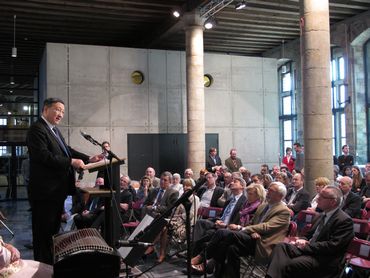| Remarks by Ambassador ZHANG Yuanyuan at Opening Ceremony of Exhibition on Chinese Labor Corps |
| 2010-04-26 16:03 |
|
Dear Friends, Ladies and Gentlemen, Allow me first to say a few words beside my prepared remarks. I am very touched by the heavenly music we have just heard. It is thoughtful to have traditional Chinese tones played on this occasion. I am very touched by the building we are in. it is a building that was completely flattened in WWI and was rebuilt bit by bit through hard work spanning several decades. I am also very touched by such a large and enthusiastic turnout. I did expect a small crowd of government officials. But here I see people from all walks of life sharing a keen interest in the subject. I am very grateful indeed. It is my great honor to be entrusted with a happy and meaningful task of opening a special exhibition here, one that publicly acknowledges the important contribution made by thousands of Chinese laborers in World War One. Let me begin by expressing, on behalf of the Chinese Embassy in Belgium and in my own name, my heartfelt thank for your presence at this function and my profound appreciation of the commendable efforts made by In Flanders Fields Museum of Ieper and many hardworking individuals for this exhibition over the years. The Chinese laborers, known as CLC totaling over 140 thousands, worked here in Europe between 1916 and 1918. Though not soldiers, they played an indispensable role in bringing about peace and helping rebuild war-ravaged nations. Around 50 thousand CLC are believed to have served in Ieper and surrounding areas. Though not soldiers, they were subjected to military regimentation and battlefield disciplines. Working and living conditions were not only harsh but fraught with dangers. Very often, they found themselves operating at the frontlines or right in the trenches facing enemy fire. They were poorly equipped and inadequately protected since few knew or understood the deadly warfare they were facing. This explained the high casualty CLC suffered. According to China's official statistics, of those registered working with the British force, 9.9 thousand perished. By a post-war account, of all the CLC serving the French and British forces, nearly 20 thousand were listed either as killed or missing. Today, we may find tombs belonging to 1874 Chinese laborers in 69 cemeteries in Belgium and Northern France. Still many others left no trace at all, as in the sinking of the "Athos", ship carrying hundreds of Chinese laborers in the Mediterranean on the way to Europe. Then, why did China send its laborers to Europe in WWI? What was the impact of this action on China itself? In particular, how would Chinese people today view this specific episode of their history? I suppose there are already standard answers. But let me just share my own personal observations with you. First, China has always wanted to be part of the world. Undeniably, there had been times when narrow-minded rulers thought the kingdom was itself the world. But realities in the 19th and early 20th century taught China that the country's interests could be better served by joining the world. This understanding gained increasing traction not only at the leadership level but also among the masses. China, by declaring war on the Germans and then sending laborers to help Allied war efforts, secured its status as a victorious nation in WWI, which could allow China to reclaim sovereign rights over its German-occupied Shandong province. Second, up to the point of CLC, the West's penetration of Chinese society was only a partial success. The presence of so many ordinary Chinese in Europe, by far the most advanced continent, provided China with a valuable window on the outside world at a crucial juncture in China's nation building. Things such as mechanized production, modern education, medicine, and social undertakings inspired the progressive and reform-minded Chinese, particularly the young people. The devotion and hard work of the Chinese laborers won admiration from the country's own elite. The Chinese students in Europe many of whom coming from rich family background, broke from tradition by contacting and befriending with CLC, and developing projects for them, such as literacy campaign, trade union activities, and rural development programs. In retrospect, what the Chinese laborers did not only contributed significantly to China's journey towards, a national identity, but went a long way to bringing the country into the modern era. Third, CLC sowed the seeds for many important events in China's modern history. With the contribution of the Chinese laborers as such, the peoples in China naturally expected that the international community would uphold justice by helping China's cause in Shandong. When hat was denied, protesting students took to the street in Beijing in what we know as the May 4th Movement of 1919, and workers, farmers and merchants jointed them. A storm of nationalism swept over China and coming out of it were such key players of 20th century Chinese politics as the communists and nationalists. In a way, what CLC went through 90 years ago reflected China's struggle to seek its rightful place in the world and in history. That experience remains relevant today, as the Chinese people are still dreaming the dreams of their forefathers: a world free of scourge of war, where people of all lands and colors living harmoniously in peace, equality and amity while working to build a better life for future generations. In conclusion, let me express many thanks to the Belgian people for helping preserve the history of Chinese laborers in WWI. I look forward to other projects under this theme and wish the IFFM continued success in the future.
|
 | ||||||||||||
 | ||||||||||||
|

